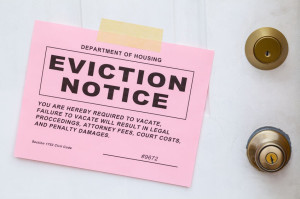 As a landlord, evicting tenants can be a tricky and stressful process. Whether tenants have violated the terms of their lease agreement or haven’t paid rent for several months, communication is key in eviction. As a landlord, it’s crucial to approach eviction with empathy, transparency, and understanding of the legal implications involved. Knowing how to handle evictions with professionalism will help you to avoid any legal consequences or damage to your reputation.
As a landlord, evicting tenants can be a tricky and stressful process. Whether tenants have violated the terms of their lease agreement or haven’t paid rent for several months, communication is key in eviction. As a landlord, it’s crucial to approach eviction with empathy, transparency, and understanding of the legal implications involved. Knowing how to handle evictions with professionalism will help you to avoid any legal consequences or damage to your reputation.
In this blog, we’ll discuss five tips for effectively communicating with your tenants about the eviction process. We know that many Long Island landlords also rent out short-term and vacation rentals, so we will also touch on evicting short-term tenants or vacation rental tenants from properties.
1. Start with a respectful conversation
Before starting the eviction process, it’s essential to have a conversation with your tenants. It’s possible that they are unaware of their violation or late payments and may be willing to resolve the issue if given a chance. Be empathetic towards their situation, listen to their side of the story, and approach the conversation with a problem-solving mindset. If you show your tenants that you’re willing to work with them, chances are they will reciprocate the effort. We are all only human, and the situation can be emotional for both parties, but as the landlord, it’s your responsibility to maintain your composure, use a respectful tone of voice, and avoid using any angry or threatening language. It’s essential to avoid heated arguments that can escalate the situation. Usually, if there’s been extenuating circumstances or a miscommunication, the situation can be easily resolved. For example, if non-payment of rent is the issue, consider offering the tenant a payment plan to catch up on rent.
2. Provide legal notice
If the initial conversation does not yield results, the next step is to provide your tenants with a legal notice of eviction. This should always be a written notice and should outline the reasons for eviction and the specific violations of the lease agreement. While this may sound harsh, it’s important to have a paper trail of the eviction process for legal purposes. Make sure to include important details like the date by which the tenant is expected to leave and the consequences of not complying with the notice. Having everything in writing can help avoid any misunderstandings or disputes later on. Make sure you understand your state’s laws regarding eviction notices and follow the correct procedure. You can find answers to frequently asked questions regarding evictions in Long Island by visiting the Suffolk Country District Court website.
3. Get expert guidance
It’s always a good idea to consult with professionals familiar with the eviction process, especially if you are a new landlord or have never dealt with eviction before. A lawyer or vetted property management agency can guide you through the legal process and offer advice on protecting your interests as a landlord. They can also help you navigate potential roadblocks, such as tenants filing counter-claims or appeals. When you work with PMI Lighthouse, you always get our Eviction Guarantee when you subscribe to our Eviction Protection Plan, which means you won’t have to worry about any costs incurred because of eviction up to $2,000.
4. Be transparent about the eviction process
As the landlord, you should be transparent about the eviction process with your tenant. Make sure to inform them of the steps involved, including any legal proceedings or court appearances. This will help the tenant understand the seriousness of the situation and what to expect. It’s also essential to be transparent about any fees or costs associated with the eviction process. Remember, emotions can run high during the eviction process, but it’s important to remain professional at all times. Avoid confrontational language or behavior and keep all communication in writing to avoid misinterpretation. Remember, any negative interactions with tenants can potentially harm your reputation and affect future tenant retention.
5. Offer resources for relocation
One way to maintain a good reputation as a landlord in your area is to offer resources for relocation to the tenant being evicted. This could include information about other rental properties in the Long Island area, job search resources, or social services organizations. Showing empathy while your tenant transitions to their next living arrangement shows that you are not vindictive and will communicate to future renters that you aren’t just a landlord but also part of the Long Island community.
Evicting renters from short-term vacation rentals
Many Long Island landlords own short-term vacation rental properties along the beautiful Long Island shorelines. While vacation renters tend to be respectful and trustworthy, there can be situations when you need to evict renters from the property. Evicting vacation rental tenants is slightly different from evicting long-term tenants, as no lease agreement is involved. If you need to evict these tenants, make sure you understand the terms and conditions of your rental agreement and follow the correct procedure in accordance with state laws. It’s also important to communicate with the tenant as soon as possible to avoid any misunderstandings.
Don’t want to deal with the stress of eviction? PMI Lighthouse has you covered.
Evicting tenants can be an unpleasant experience, but it’s a necessary step in protecting your investment and enforcing the terms of your lease agreement. As a landlord, it’s crucial to approach eviction with empathy, transparency, and a willingness to communicate effectively with your tenants.
If you’d rather skip the stress of eviction, consider expert property management services from PMI Lighthouse. We offer local, trusted property management services to Long Island area landlords and property owners, including our Eviction Guarantee. When you work with PMI Lighthouse, you can subscribe to our Eviction Protection Plan. This plan means you never have to worry about the stress or costs of eviction, but PMI will handle the entire eviction process plus the legal costs associated with the eviction, up to $2,000.
Learn more about our Eviction Guarantee and take our free rental analysis to find out how PMI Lighthouse could help take eviction stress off your shoulders.







